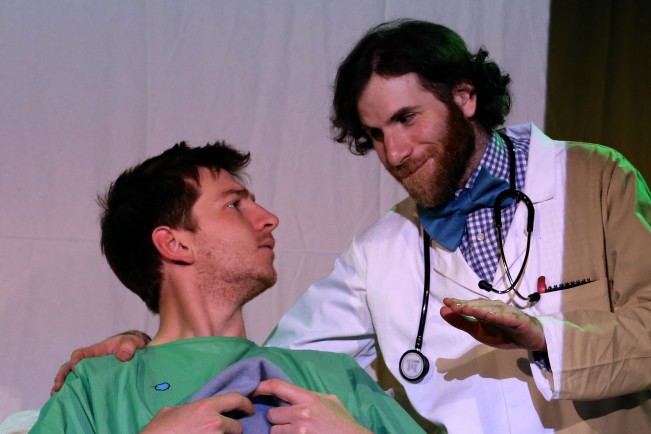You have no items in your cart. Want to get some nice things?
Go shopping
Last week, Lochlan Bloom reviewed Window, a piece at the Camden Fringe that billed itself as a “multimedia thriller”. Up to a point, the same description can be said of Heads Bodies Legs. Set in a private hospital where the line between patient and staff is blurred beyond recognition, the play has a thriller-like narrative and multimedia production values – in addition to a taut script and an excellent cast.
Jon is sick. To pay for his treatment, he has forgone the possession of his soul – a fact he learns only when awaking from an operation in a creepily desolate ward. The weirdly chipper Nurse evades all of his questions; Dr M answers only in opaque metaphors. Determined to reclaim his lost possession, Jon slowly makes his way around the hospital in search of the mysterious head of the institute, Dr S.
Jon’s search leads him to interrupt a conversation between a married inmate couple whose stay in the hospital has seemingly caused them to lose all sense of their identities and the outside world as a whole. Their attempts in vain to recall fragments of their selves make for a striking, darkly comic scene. When Jon does finally track down the elusive doctor, she turns out to be intimidatingly bird-like and just as cryptic as her colleagues in answer to Jon’s progressively frenzied questioning.
The play’s most memorable moments arrive when Jon finally manages to track down his soul, which is embodied as an attractive, coy woman clad in a skin-tight white Lycra suit, whose mouth gapes in silent agreement to Jon’s every suggestion. Their wordless night in is equally compelling and disturbing, as Jon flits between spiritual dread and fevered narcissism. The resulting existential – and rather troubling – sex scenes are directly followed by a sugary, dreamlike dance scene featuring the whole cast. The jarring shift in tone is representative of the play’s absurdly erratic nature, and it impresses – even if the dance passage is a little overlong.
Ezra Elia’s script is well-crafted and frequently very funny, portraying a series of circuitous interactions yet steering clear of repetition, and the play’s structure is evidently a considered one; motifs are carried across acts with fine subtlety. No stranger to comic existentialism, the author has previously penned a book (The Diary of Edward the Hamster) and a BBC Radio 4 series (A Series of Psychotic Episodes), both co-written with sister Miriam. The play’s meditations on the sense of the self are resonant and have definite depth, with a number of the images lodging themselves in the brain, obstinately refusing to budge even days after the performance.
The play’s major strength, however, is its casting: each performer displays physicality and conviction across a number of roles each. Eleanor Jones is brilliantly eccentric as Nurse, Lee Ravitz turns in idiosyncratic yet distinct turns as both Dr M and eager soul purchaser Mr Rodgers, Giles Coram glues the piece together as the exasperated straight man at the centre of chaos, Carolin Ott is genuinely frightening as Dr. S, and Alex Froom and Clare Buckingham both impress in supporting roles.
Behind the stage is a screen that sporadically plays crude but effective animated motifs; these fit into the live action fluidly courtesy of Ray Malone’s confident direction. The sensitive sound design adds to the play’s disquieting atmosphere, although it is almost drowned out by traffic noise and an intrusive drone presumably caused by the venue’s air conditioning.
At its best, the play achieves the heady mix of eerily nightmarish mood, black humour and unpredictability conjured by Terry Gilliam’s Brazil and Leos Carax’s arthouse adventure Holy Motors. Staged by a theatre company of the same name, Heads Bodies Legs is a deliriously entertaining play, firmly asserting the collective talent of its cast and crew.
Heads Bodies Legs ran at Camden People’s Theatre from August 6th-25th as part of Camden Fringe.




